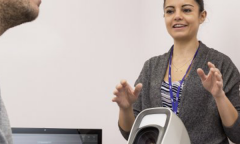Here we list what can be useful to know about someone’s epilepsy, and what to look out for and note, before, during, and after a seizure. This may help a doctor to confirm a diagnosis or identify the type of seizures someone is having.
Recording information about seizures
Some people cannot remember what happened to them during a seizure and may not be aware that they have even had one. This can make it difficult for them to describe their seizures to their specialist. If you have witnessed a seizure, the questions below may be helpful for the person to share with the specialist.
- How did the seizure start?
- If known, when the seizure started, was the person awake or asleep?
- Was the person restless or did they cry out before the seizure started?
- Was there any trigger for the seizure (such as feeling tired, stressed, excited, or unwell)?
- What position were they in when the seizure happened or when they were found (standing, lying on front, lying on back, lying on side, sitting, other)?
- Did they appear to have any warning beforehand? If so, what did you notice?
- Did they have any unusual sensations, such as a taste or smell, a rising feeling in the stomach, numbness, or pins and needles? When did they experience this?
- Was there any change in muscle tone (did they become stiff or floppy)?
- Did they fall down and, if so, forwards or backwards?
- Did they lose awareness, appear dazed or confused or lose consciousness?
- Was there any change in their breathing pattern? Did they have difficulty breathing?
- Did their face change colour? Did they become pale, blue around the mouth, or flushed?
- Were their eyes open or closed during the seizure? If open, were their eyes turned to one side (which side)?
- Was there any movement, such as jerking or twitching? If so, was this rhythmical? Was it on both sides of the body or on one side only and, if so, which side? Was it symmetrical (exactly the same on both sides) or not symmetrical?
- Were there any automatisms (automatic behaviours) such as wandering around, chewing or lip-smacking, making strange movements or postures with their limbs, picking up objects for no reason, or fiddling with clothing?
- Did they make any noises, such as mumbling, not making sense, or repeating words or phrases?
- How long did the seizure last?
- Were they incontinent (did they wet themselves)?
- Did they bite the inside of their cheek or their tongue?
- How were they afterwards? Were they confused or sleepy? If they slept afterwards, for how long? Or were they immediately back to their normal selves?
How long did it take for them to fully recover and return to normal activities?
Epilepsy Society is grateful to Dr F J Rugg-Gunn, Consultant Neurologist & Honorary Associate Professor Clinical Lead, Chalfont Centre for Epilepsy, who reviewed this information.
Information updated: September 2025. Review date September 2027
Download this information
For a printed copy contact our Helpline.

Epilepsy Society's confidential helpline is available for anyone affected by epilepsy.
Call us on 01494 601400. You can also reach us by email helpline@epilepsysociety.org.uk or chat with us online.
Diagnosing epilepsy
Diagnosing epilepsy
Diagnosing epilepsy usually involves collecting information from different tests, finding out what happens before, during, and after your seizures, and speaking to someone else who might have seen your seizures. With all the collected information the most likely cause of your seizures may be found.


